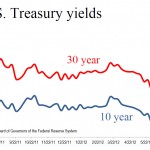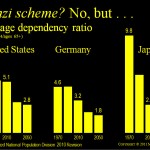Back when it was published every other week, I used to treasure Fortune magazine. I looked forward to the iconic annual list of the largest companies. I loved Fortune’s deeply analytical long-form journalism on industries, companies and long-term economic trends. To cite just one example of excellence, more than any [continue reading . . . ]

Interest rates on U.S. Treasury notes with a maturity of 10 years fell last month to nearly the lowest since World War II. They may go lower still. Today’s low rates reflect both the weak outlook for most advanced economies and a desperate scramble globally for safe places to park [continue reading . . . ]
Don’t miss today’s Heard on the Street item in the Wall Street Journal headlined “Central Banks Tilt at Global Windmills.” The item, by Richard Barley, notes that “the People’s Bank of China, the European Central Bank and the National Bank of Denmark all cut rates Thursday, and the Bank of [continue reading . . . ]
The economic headlines are grim almost everywhere you look. An item on Page 1 of today’s Financial Times sums things up succinctly: Growth in the US is slowing, much of Europe is in recession, China’s growth outlook has weakened, the reform processes in India have stalled and other large emerging [continue reading . . . ]
Martin Wolf, much-honored chief economics commentator of the Financial Times, has been my beacon during the financial crisis. So it is especially discouraging to read his June 6, 2012, column, headlined “Panic has become all too rational”. Wolf argues that the advanced economies are caught in a “contained depression,” that [continue reading . . . ]
Uh, oh. That’s what I find myself muttering these days when I fire up the news browser or open my morning papers. The economic news leaves me with a sense of dread. I find three developments especially worrisome: 1. Europe’s slow-motion economic crisis, now more than three years old, rumbles [continue reading . . . ]
Are America’s best days in the rear-view mirror? The Economist‘s Lexington columnist reminds us (May 12, 2012, print edition) that bouts of what it labels “declinism” are, well, almost as American as apple pie. It wasn’t so long ago that Japan was buying up iconic U.S. real estate (New York [continue reading . . . ]
“For Big Companies, Life is Good.” That was the headline on the Marketplace Section front page of the Wall Street Journal April 9. The item reported that sales, profits and employment of the largest American companies, the Standard and Poor’s 500, last year exceeded the highs reached before the Great [continue reading . . . ]
With 30 years of service, most employees of Washington state can retire with full defined-benefit pension benefits at age 62. Given today’s life expectancies and low investment returns, this places an enormous burden on taxpayers, most of whom don’t have the luxury of defined-benefit plans. Republicans in the Washington State [continue reading . . . ]
The Tea Party? Not for me, thanks. But I am outraged as the next person by abuse of public trust. How about a $300,000 luxury party boat purchased by the good folks at NOAA. Or a Snohomish County executive who traveled widely with his mistress on the public dime (see [continue reading . . . ]
“My idea of a good conversation is to find someone who will listen to me.” I’m not sure of the provenance. I’ve seen it attributed to George Bernard Shaw, but it also sounds like Mark Twain. If you know, help me out. The quote gives me an excuse to say that [continue reading . . . ]

Is Social Security a Ponzi scheme, as Texas Gov. and GOP presidential candidate Rick Perry labeled it during the GOP candidates’ debate Sept. 7? The answer is “No.” Charles Ponzi gave money collected from early suckers attracted by phony promises of high returns to new suckers after taking a cut. [continue reading . . . ]